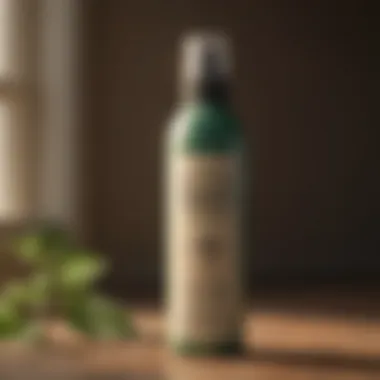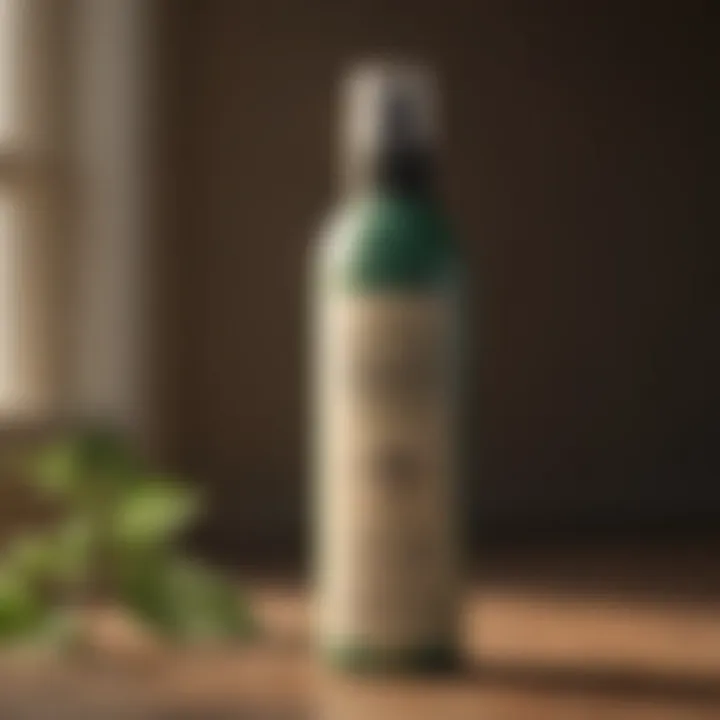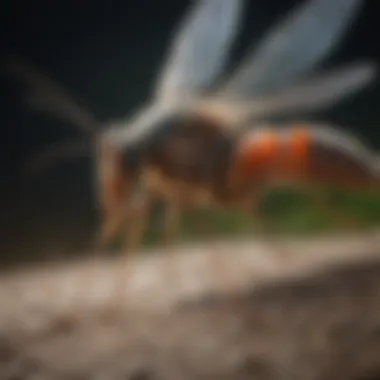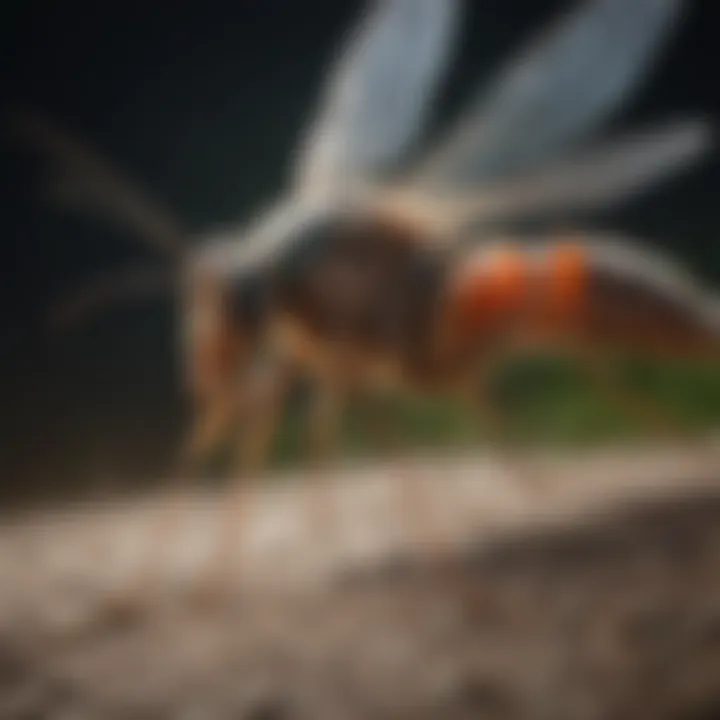Effective Mosquito Repellents: Natural and Commercial Solutions


Intro
Mosquitoes represent more than just a nuisance; they pose serious health risks to humans through their ability to transmit diseases. Understanding these pests is crucial for effective management and prevention. This article delves into effective strategies and products designed to repel mosquitoes, ranging from natural remedies to commercially available repellents. Emphasis will be placed on not only individual methods but also on an integrated pest management approach that addresses this issue thoroughly.
Understanding the Pest
Identification
Mosquitoes can typically be identified by their long legs and slender bodies. They have two wings and long mouthparts (proboscis), which they use to draw blood. Common species include Aedes, Anopheles, and Culex, each with unique characteristics and behavior patterns. Recognizing these traits aids in determining where they may breed and how to effectively repel them.
Life Cycle
The life cycle of a mosquito consists of four stages: egg, larva, pupa, and adult. Each stage offers different opportunities for management:
- Eggs are laid in stagnant water.
- Larvae develop in water, feeding on organic material.
- Pupae undergo transformation before emerging as adults.
This cycle can vary between species, but typically, from egg to adult can take as little as a week in ideal conditions. Understanding this cycle is fundamental for effective mosquito control strategies.
Pest Prevention Strategies
Environment Modification
Modifying the environment can significantly hinder mosquito development. Key actions include:
- Eliminating standing water: Regularly check for places where water collects, such as pots, gutters, and bird baths.
- Smart landscaping: Maintaining a tidy yard helps. Trimmed shrubbery and mowed lawns reduce shady areas where mosquitoes gather.
Physical Barriers
Physical barriers serve as effective means to keep mosquitoes at bay. Options include:
- Screens: Installing screens on windows and doors.
- Netting: Using fine mesh netting over beds or porches can protect against bites during outdoor activities.
Control Methods
Chemical Control
Chemical repellents are widely used and can be very effective. DEET, picaridin, and oil of lemon eucalyptus are well-researched active ingredients that provide varying degrees of protection. While highly effective, caution is necessary due to potential health effects associated with their use, especially around children and pets.
Biological Control
Biological methods can also be beneficial. Introducing natural predators such as fish that eat mosquito larvae can help control populations in larger water bodies. Similarly, certain bacteria, like Bacillus thuringiensis israelensis (Bti), can specifically target mosquito larvae without harming other wildlife.
Biological control approaches can aid in sustainable mosquito management by working in harmony with nature.
Understanding Mosquito Behavior
Understanding how mosquitoes function and thrive is crucial for effectively repelling them. By grasping their lifecycle, attraction factors, and habitat preferences, individuals can devise targeted strategies to limit mosquito presence.
Life Cycle of Mosquitoes
Mosquitoes undergo a four-stage lifecycle: egg, larva, pupa, and adult. The female mosquito lays her eggs in or near water, where they hatch into larvae. The larvae reside in the water, feeding and growing until they enter the pupal stage. Within a few days, the pupa transforms into an adult mosquito. This knowledge of the lifecycle enables homeowners to identify when and where control measures should be implemented. For instance, treating water sources can significantly disrupt the mosquito population right at the egg or larval stage, helping minimize adult emergence.
Factors Influencing Mosquito Attraction
Mosquitoes are drawn to various stimuli, including carbon dioxide, body heat, sweat, and scents. Human and animal emissions of carbon dioxide signal the presence of potential hosts. Additionally, certain bacteria on our skin can produce odors that attract mosquitoes. Studies show that people with more body heat and perspiration are often more appealing to these pests. By understanding these attraction factors, individuals can wear lighter colors, avoid strong fragrances, and use personal repellents effectively.
Habitat Preferences
Mosquitoes prefer specific environments that provide standing water for breeding and areas that offer shelter from wind. They thrive in warm, humid climates. Common habitats include ponds, marshes, flowerpots, and clogged gutters. By recognizing these preferred habitats, homeowners can prevent mosquito breeding by eliminating standing water around their properties. Ensuring proper drainage and regular yard maintenance can significantly reduce the likelihood of attracting mosquitoes to residential areas.
"A proactive approach towards managing the environment can lead to a substantial reduction in mosquito populations."
In summary, comprehending mosquito behavior is not merely academic. It facilitates informed decisions about prevention and control. Each aspect—from lifecycle to attraction factors and habitat preferences—plays a pivotal role in effective mosquito management.
Natural Repellents
Natural repellents are crucial in the fight against mosquitoes. They provide alternative solutions to chemical repellents, which often carry high health risks. Natural options tend to be more eco-friendly and can be safer for both humans and pets. Moreover, many people are looking for products that do not contain synthetic ingredients. The benefits of using natural repellents include their availability, lower toxicity, and often pleasant scents. However, it is essential to understand their efficacy and limitations.
Essential Oils and Their Efficacy
Essential oils are extracted from plants and have unique properties that repel mosquitoes effectively. Each type of oil has its own characteristics, making some more popular than others in repelling insects.


Lemon Eucalyptus Oil
Lemon Eucalyptus Oil is noteworthy for its strong repellent properties. Its active ingredient, PMD, is recognized for being a natural alternative to DEET. This oil is popular because it can last for several hours, offering prolonged protection. The refreshing scent is another appealing aspect. However, it can cause skin irritation in sensitive individuals, so patch testing is advisable before widespread use.
Lavender Oil
Lavender Oil stands out because of its pleasant fragrance and calming effects. It not only repels mosquitoes but also soothes the skin if bitten. This dual purpose increases its desirability among users. Though it may not last as long as other options, its reputation as a natural remedy emphasizes its value. The main drawback is that while it may deter some mosquitoes, it is generally less effective against all species compared to stronger oils.
Peppermint Oil
Peppermint Oil is known for its invigorating scent and powerful insect-repelling properties. It works by masking scents that attract mosquitoes. Many view it as a versatile choice, suitable for various indoor and outdoor applications. Nevertheless, its strong aroma may not be tolerable for everyone, and it can cause skin reactions in some individuals, necessitating caution when applying directly to the skin.
Herbal Plants That Repel Mosquitoes
Certain herbal plants naturally repel mosquitoes and can be planted in gardens or used in indoor settings. These plants provide aesthetic benefits too, enhancing the beauty of outdoor spaces while serving a purpose.
Citronella Grass
Citronella Grass is perhaps the most famous natural deterrent. Its strong smell masks scents that attract mosquitoes, making it a popular choice. Many use it in candles or oils. Planting Citronella in the garden helps create a mosquito-repelling barrier. One downside is that its effectiveness diminishes in windy conditions, thus requiring more frequent reapplication when used in oils or candles.
Marigolds
Marigolds are colorful flowers that have pest-repelling capabilities. They contain certain compounds that can deter mosquitoes. Their beauty makes them a favorable option for those looking to enhance their gardens while keeping insects at bay. However, their effectiveness can vary based on species and climate, so it may not be as prominent as other natural repellents.
Basil
Basil serves dual purposes as both an herb used for culinary dishes and a mosquito repellent. It has a strong scent that mosquitoes dislike. Basil can be grown in pots indoors or outdoors, making it quite practical for households. The only limitation is that it requires regular watering and sunlight to thrive, which could be a challenge for some gardeners.
Vinegar as a Deterrent
Vinegar, particularly apple cider vinegar, is often suggested as a mosquito deterrent. The acetic acid in vinegar can irritate mosquitoes, making them less likely to approach. Additionally, it can be used as a skin spray when diluted with water. The main advantage is that it is a readily available and inexpensive option. However, some users may find the smell unpleasant, and it may not work for everyone.
Commercial Repellents
Commercial repellents serve an essential role in the ongoing battle against mosquitoes. These products are formulated to provide effective protection, allowing individuals to enjoy outdoor activities without the fear of bites. Understanding their effectiveness, safety, and utility is crucial in selecting the right product for personal use.
Using commercial repellents can significantly reduce the likelihood of mosquito bites. They contain various active ingredients that disrupt the mosquito's ability to locate human hosts. This section explores commonly used active ingredients, examining their effectiveness and safety for consumers. It’s also important to consider individual sensitivity and any potential reactions. In a world increasingly conscious of eco-friendliness, many repellents now boast formulations that prioritize safety for both humans and the environment, a detail worth noting.
DEET: Effectiveness and Safety
DEET is one of the most recognized and widely used active ingredients in commercial mosquito repellents. Its effectiveness stems from its ability to effectively mask the scent of human skin, thwarting the detection abilities of mosquitoes. Studies have shown that DEET provides protection that can last for several hours, even against strong mosquito populations.
However, concerns often arise regarding its safety. It is generally considered safe when used according to the manufacturer's guidelines. Individuals should apply DEET only to exposed skin and never directly to the face. It’s advised to wash off any residue after returning indoors to avoid prolonged skin exposure. For children, it is important to ensure adult supervision during application.
Picaridin and Its Benefits
Picaridin is a newer alternative to DEET, gaining popularity for its safety profile and effectiveness. It works similarly to DEET by impeding mosquitoes’ ability to sense human prey. Many users prefer Picaridin due to its non-greasy texture and minimal odor, making it a more pleasant option for daily use.
From a safety standpoint, Picaridin is known to be less irritating to the skin and eyes, which is beneficial for individuals with sensitivities. Studies indicate that it may offer effective protection for several hours, comparable to DEET. This makes it a suitable choice for outdoor activities, especially in areas with dense mosquito populations.
Oil of Lemon Eucalyptus
Oil of Lemon Eucalyptus is derived from the leaves of the lemon eucalyptus tree and has been noted as an effective natural repellent. It contains a compound called PMD (para-menthane-3,8-diol), which has been proven to provide mosquito bite protection comparable to DEET.
The appeal of this ingredient lies in its natural origin, attracting consumers who prefer environmentally friendly solutions. Additionally, it has a pleasant scent compared to traditional chemical repellents. However, it is important to note that the oil should not be directly applied to the skin without dilution. Users must also consider that the protection duration may not be as long as DEET or Picaridin, requiring more frequent application.
In summary, commercial repellents represent a key strategy for mosquito prevention. Understanding the various options available, such as DEET, Picaridin, and Oil of Lemon Eucalyptus, allows consumers to make informed choices that best fit their needs and lifestyle.
Physical Barriers
Physical barriers play a crucial role in repelling mosquitoes and minimizing their presence in various environments. As we aim to keep these pests at bay, employing strategies that physically prevent their access can offer a significant advantage. Utilizing barriers not only reduces the likelihood of mosquito bites but also enhances the overall comfort of living spaces.
Screening Solutions
Window Screens
Window screens are an effective solution for keeping mosquitoes out while allowing fresh air to circulate in homes. One key characteristic of window screens is their ability to filter out insects without obstructing ventilation. This makes them a popular choice among homeowners. They come in various materials such as fiberglass and aluminum, which contribute to their durability.
The unique feature of window screens lies in their accessibility and ease of installation. Homeowners can either buy ready-made screens or create custom ones to suit their specific window sizes. While they are largely beneficial, it's important to regularly check for damages such as holes that could allow mosquitoes to enter. Maintaining these screens is crucial for ensuring their effectiveness in mosquito prevention.
Screened Porches


Screened porches extend the benefits of indoors by providing a space that is protected against mosquitoes. This type of structure not only enhances outdoor living but also serves as a protective barrier against pests. One key aspect of screened porches is their ability to blend outdoor enjoyment with indoor comfort.
The significant feature of screened porches is their large area, which allows for ample ventilation while keeping out unwanted insects. However, they can be more expensive to construct compared to simple window screens. On the other hand, they offer the advantage of a pest-free zone for families to enjoy in comfort, especially during warmer months. Evaluating installation and maintenance costs will help decide if this option fits one's budget.
Mosquito Nets
Types of Nets
Mosquito nets are essential for those looking to create a bite-free sleeping environment. The main types of nets available include rectangular and conical shapes, each serving its specific use. Rectangular nets are commonly used over beds while conical nets are suitable for hanging from ceilings.
One key characteristic of these nets is their fine mesh which prevents even small mosquitoes from passing through. Choosing the appropriate type is crucial for maximizing their effectiveness. While they provide excellent coverage, nets require diligence in ensuring they remain intact and so that there are no gaps that could allow mosquitoes to enter.
Proper Usage
Proper usage of mosquito nets significantly impacts their effectiveness. They should be tucked in under mattresses or secured tightly to prevent openings that can be exploited by mosquitoes. Ensuring that nets are kept in good condition is vital. Regular inspections help identify any wear or tear that may compromise their functionality.
A key characteristic of proper usage is consistency. Nets should be used every night, especially in areas where mosquitoes are prevalent. This consistency ensures that the protective layer remains effective at all times. In terms of disadvantages, nets can be cumbersome during use, especially in smaller living spaces, but their protection usually outweighs these inconveniences.
Clothing and Protective Gear
Wearing appropriate clothing can be an additional layer of defense against mosquitoes. Lightweight, long-sleeved shirts and long pants made of breathable materials can reduce exposed skin, thereby minimizing the chances of mosquito bites. Additionally, more specialized protective gear, such as hats and socks treated with repellent, can enhance personal safety outdoors.
Environmental Management Strategies
Environmental management strategies are crucial in the fight against mosquitoes. These approaches focus on altering the environment to make it less conducive for mosquito breeding and survival. By reducing appealing habitats, one can significantly minimize the mosquito population. Such strategies are not only effective but also eco-friendly, presenting a sustainable alternative to chemical controls. This section discusses several key elements in managing your environment to keep mosquitoes at bay.
Eliminating Standing Water
Standing water is the primary breeding site for mosquitoes. Females lay eggs in stagnant water, which can lead to rapid population growth. Therefore, removing places where water collects is vital. Consider areas like clogged gutters, bird baths, and plant saucers. Making these environments inhospitable for mosquitoes can drastically reduce their numbers. Even small amounts of standing water can support mosquito larvae. Checking regularly and emptying containers is a simple yet effective practice for any homeowner.
Landscaping for Mosquito Control
Landscaping can be an effective way to control mosquito populations. It involves strategically designing your outdoor space to hinder mosquito habitats.
Plant Selection
Choosing the right plants can make a difference in mosquito control. Some plants, such as citronella and marigold, have natural repellent properties. Citronella, for instance, contains compounds that deter mosquitoes effectively. These plants not only beautify your landscape but also offer significant protection against pests. However, ensure the selected plants thrive in your local climate. Potential drawbacks include their maintenance needs and possible attraction of other pests.
Debris Management
Managing debris is another important aspect. Overgrown vegetation, leaf litter, and other organic materials can retain moisture and provide shelter for mosquitoes. Regularly clearing your yard can minimize these hiding spots. It is beneficial because it enhances the overall look of your property while keeping mosquito breeding sites to a minimum. One must consider that a tidy yard requires consistent effort, which can be a disadvantage for busy homeowners.
Encouraging Natural Predators
Encouraging natural predators presents another layer of mosquito control. Bats, birds, and certain insects like dragonflies and frogs feast on mosquito larvae and adults. Creating habitats for these predators can help control mosquito populations organically. You can install bat houses and bird feeders or maintain a garden that attracts these beneficial animals. By promoting a balanced ecosystem in your yard, you can harness nature to keep mosquito numbers down, which is beneficial and minimizes reliance on chemical products.
Chemical Control Methods
Chemical control methods play a vital role in any strategy against mosquitoes. Insects, especially mosquitoes, can quickly develop resistance to various types of control measures, making it imperative to understand and implement effective chemical solutions. Mosquitoes are not just a nuisance; they are vectors for various diseases, including West Nile virus, Zika virus, and malaria. Therefore, employing the right chemical methods to reduce their populations is necessary for public health as well as comfort in outdoor activities.
When discussing chemical control methods, it’s essential to note that safety and effectiveness are key considerations. This section will delve into the use of insecticides and larvicides, as well as the Integrated Pest Management (IPM) approach, which combines various methods for a more holistic solution.
Insecticides and Residual Sprays
Insecticides are commonly used for immediate mosquito control. These chemicals, when applied, can kill adult mosquitoes upon contact or ingestion. Residual sprays are notable because they remain effective for extended periods, reducing the need for frequent applications. This method allows homeowners to achieve long-lasting control over mosquito populations in their environment.
Types of Insecticides
There are various types of insecticides available in the market, including synthetic options like pyrethroids and organophosphates.
- Pyrethroids: These act quickly against adult mosquitoes, providing immediate relief. Their fast-acting nature makes them a popular choice for outdoor spraying.
- Organophosphates: While effective, they require careful handling due to their potential toxicity to humans and pets.
The key characteristic of these insecticides lies in their specific mechanisms. They disrupt the nervous system of mosquitoes, leading to paralysis and eventual death. This efficacy makes insecticides a beneficial choice within this article, particularly for scenarios requiring rapid population control. However, one disadvantage is the potential for chemical resistance among mosquito populations.
Application Techniques
Application techniques dictate how effective insecticides will be. Techniques vary from aerial spraying to localized ground applications. Homeowners often utilize spray cans or foggers for at-home treatments.
- Aerial Spraying: Ideal for large areas, this method provides thorough coverage quickly.
- Localized Spray: More suited for targeted areas, such as yards or gardens.
The key characteristic of proper application techniques is coverage and concentration. Incorrect application can lead to inadequately treated areas, leaving mosquitoes unharmed. This is a popular choice among homeowners who wish to tackle persistent infestations effectively. However, the risk includes exposure to non-target species, including beneficial insects.


Larvicides: Targeting Mosquito Breeding
Larvicides focus on mosquito life stages before maturity, targeting larvae. Applying larvicides to standing water where mosquitoes breed can significantly reduce their overall population. Products often contain formulations that disrupt growth or kill larvae before they can transition into adults. This proactive approach can prevent the emergence of adult mosquitoes, thus reducing future infestations.
Integrated Pest Management Approaches
IPM combines chemical control with other methods, such as environmental management and biological control. This multifaceted approach not only addresses existing infestations but also seeks to prevent future outbreaks. An effective IPM plan may involve:
- Monitoring mosquito populations and their habitats.
- Using insecticides in conjunction with natural predators, such as dragonflies.
- Incorporating barriers like screens or nets.
This thoughtful integration of methods is essential for long-term sustainability and effectiveness in mosquito management. IPM minimizes chemical use, promoting safer environments not just for people, but also for wildlife.
Technology-Driven Solutions
Technology-driven solutions play a crucial role in modern mosquito control. These innovations offer both convenience and enhanced effectiveness compared to traditional methods. Today's rapid advancements mean that homeowners and housewives have more options than ever for managing mosquito populations in their surroundings. Integrating technology into pest management strategies can provide long-term relief and reduce reliance on harmful chemicals.
Ultrasonic Repellents
Ultrasonic repellents operate by emitting high-frequency sound waves that are inaudible to humans but, in theory, irritating to mosquitoes. These devices claim to create a zone of discomfort that discourages mosquitoes from entering. While the idea is appealing, studies on the actual effectiveness of ultrasonic devices are mixed. Some users report a reduction in mosquito presence, while others find little to no impact. Users should consider the size of the area they wish to protect, as ultrasonic waves may not cover large spaces effectively. Additionally, the reliability of batteries or power sources for continuous use is a factor to keep in mind.
Smart Mosquito Traps
Smart mosquito traps utilize advanced technology to lure and capture mosquitoes. Many of these devices use attractive scents, such as carbon dioxide or body heat simulation, to draw in pests. Once inside, mosquitoes are trapped using a fan mechanism or sticky surfaces. One of the benefits of smart traps is that they can often be monitored through smartphone applications, allowing users to track their effectiveness in real time. However, proper placement and maintenance are essential for optimal performance.
Wearable Repellent Devices
Wearable repellent devices are innovative solutions that can be attached to clothing or worn as accessories. These devices can use various mechanisms such as releasing repellents into the environment or emitting scents that mask human body odors. Some models even incorporate ultrasonic technology. The benefit of wearables is the convenience they offer, allowing hands-free protection during outdoor activities. However, effectiveness may vary depending on the type of device and environmental conditions. Regularly checking the device’s functionality and replacing any components is necessary for continuous protection.
While technology offers new solutions for mosquito control, it is important to consider their practicality and effectiveness within your living environment.
Personal Protection Tips
Personal protection tips are essential in the context of mosquito control, especially for housewives and homeowners who desire to maintain a comfortable living environment. Mosquitoes not only cause discomfort but can also transmit diseases such as West Nile virus and Zika virus. Therefore, understanding how to effectively protect oneself from bites is vital. Adequate personal protection can significantly reduce the likelihood of these pests causing harm. Here are key aspects to consider:
When to Use Repellents
Repellents should be applied during peak mosquito activity times, which often occur during dawn and dusk. This is when mosquitoes are most active and likely to bite. It is crucial to evaluate the surrounding environment. For instance, if there is standing water nearby, that increases risk. Also, consider the geographical region. Some areas have higher mosquito populations during certain months. Monitoring local health advisories can help determine when to be most vigilant.
Optimal Application Techniques
Applying repellents properly is just as important as choosing the right product. Here are some practical tips:
- Read the label: Understand the instructions specific to each repellent, including any precautions.
- Apply evenly: Use a generous amount and ensure that all exposed skin is covered.
- Avoid over-application: More does not always mean better. Applying according to instructions is usually sufficient for protection.
- Reapply as needed: Depending on the type of repellent and its duration of effectiveness, reapply as directed, especially if perspiring or after swimming.
These steps will maximize effectiveness.
Post-Exposure Care
Despite precautions, exposure may still occur. How one addresses potential bites is essential:
- Clean the area: Wash bitten areas with soap and water to reduce infection risk.
- Apply soothing agents: Over-the-counter creams can alleviate discomfort and itching.
- Monitor any unusual symptoms: Certain reactions may indicate a more serious issue, such as an allergic reaction.
If you experience swelling or severe itching, consulting a healthcare provider promptly is advisable.
"Keeping mosquitoes at bay is not just about prevention; it's also about knowing how to react after exposure."
By following these personal protection tips, individuals can significantly mitigate the risk of mosquito bites, thus enhancing their overall quality of life in mosquito-prone areas. Taking these steps is a proactive approach that helps ensure a more enjoyable and safe home environment.
Closure
In this article, we have comprehensively explored various strategies to keep mosquitoes away, highlighting their significance in maintaining a comfortable outdoor environment. The persistent presence of mosquitoes poses health risks, including potential transmissions of diseases. Therefore, understanding effective methods is crucial for everyone, but especially for housewives and homeowners seeking solutions for their families.
Summary of Effective Strategies
Several effective strategies have been addressed throughout the article. These strategies range from natural to synthetic solutions, all designed to repel mosquitoes efficiently:
- Natural Repellents: Utilizing essential oils like lemon eucalyptus and lavender can provide a safer alternative to chemical-based products. Herbs such as citronella grass and marigolds are also known for their repellent properties.
- Commercial Repellents: Products containing DEET, picaridin, and oil of lemon eucalyptus have been shown to be effective in deterring mosquito bites. Understanding the benefits and application methods is essential for maximizing their use.
- Physical Barriers: Employing screens on windows and using mosquito nets can provide a protective barrier that minimizes exposure.
- Environmental Management: Eliminating standing water and optimizing landscaping can significantly reduce mosquito habitats, thereby controlling their population.
- Technology-Driven Solutions: Innovative devices like smart mosquito traps and ultrasonic repellents offer modern approaches to mosquito control.
Collectively, these strategies not only enhance comfort but also reduce the risk of mosquito-borne illnesses.
Future Directions in Mosquito Control
As we consider future directions in mosquito control, it is evident that continued research and innovation will play a pivotal role. Key areas to focus on include:
- Biological Control Methods: There is a growing interest in the use of natural predators and genetically modified organisms to reduce mosquito populations effectively. Understanding their ecological impacts is essential.
- Community Engagement: Raising awareness about mosquito control within communities can lead to better collaboration and effectiveness in pest management.
- Sustainable Practices: Emphasizing environmentally friendly solutions will become increasingly important, mitigating the adverse effects associated with chemical pesticides.
- Technological Innovations: Ongoing advancements in technology may see the development of more effective traps and repellents, making mosquito control more efficient.
Through these future endeavors, we will likely see a reduction in mosquito populations and, consequently, a decrease in the diseases they carry. The continuous evolution of strategies reflects the importance of remaining vigilant in our efforts to combat these pests.







